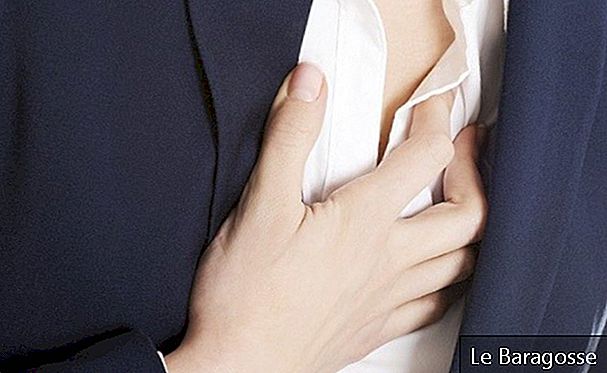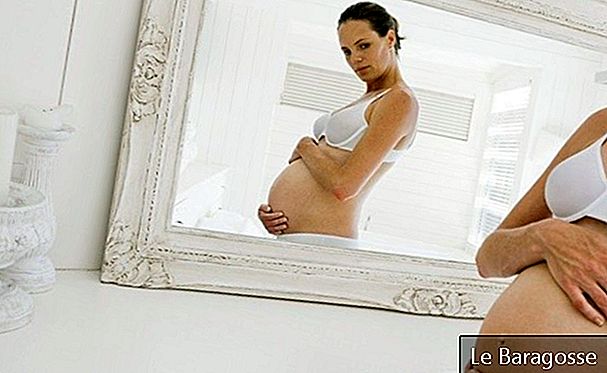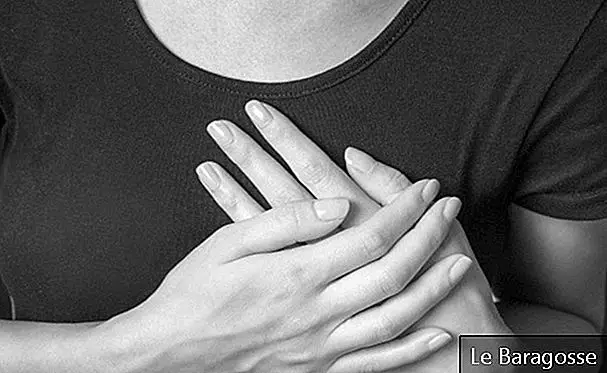
Of course breast pains are very annoying and may also worry women. Many question whether pain cannot be a sign of a more serious illness. But, for the most part, it is no big deal and may even be a reflection of the gym exercises, you know?
Below are some of the most common reasons for breast pain and guidelines on how to deal with them:
1. Menstruation
Gustavo Badan, Coordinator of the Interventional Procedures in Mastology Sector of the Women's Laboratory Femme, explains that the so-called cyclic breast pain (mastalgia) may occur.
For approximately 28 days, which corresponds to the menstrual cycle, the woman's body undergoes several changes that prepare the uterus to receive a baby. In the first 14 days (first phase of the menstrual cycle), the preparatory period for ovulation occurs, and along with it, the rise in estrogen levels. This hormone is one of those responsible for controlling women's well-being. Over the next 14 days (second phase of the menstrual cycle), the wall of the uterus begins to thicken, as if preparing a? Bed? for the possible baby. During this second phase there is a drop in estrogen levels and an increase in progesterone rates. This change, when very sudden, can cause a number of symptoms, including breast pain ?, explains the doctor.
At the end of these last 14 days, Badan adds, the endometrium (wall covering the uterus) begins to peel and be eliminated in the form of menstruation, generating with it another hormonal drop, this time in progesterone and estrogen. "So in some women the symptoms may be even more intense during menstruation," he says.
Also read: 4 Things That Affect Your Breasts, According To Science
How to deal with pain
Badan points out that cyclic breast pain seems to have a strong connection with reproductive hormones and menstrual cycle. Precisely because of this, this pain often goes away during pregnancy or after menopause. In some cases, the use of contraceptives can also alleviate menstrual cycle-related breast pain ?, he says.
2. Physical Exercises
Badan explains that exercise cannot specifically cause breast pain. "What happens is that some physical activities, especially those in the gym, can cause pain in the pectoral muscles, which are behind the breasts and, due to the nearby location, confuse with pain in the breasts," he says.
According to the doctor, this is a very common cause of concern for women and one of the main reasons for medical consultations in mastology.
How to deal with pain
In such cases, according to the doctor, the use of anti-inflammatory drugs helps to improve symptoms.
3. Poor diet
Badan explains that poor diet can lead to free radical accumulation and an imbalance of fatty acids within cells, which can affect breast tissue sensitivity and circulating hormone rates, causing breast pain.
Read also: Stop sagging breasts
How to deal with pain
In this case, the best way is to follow a healthy diet, preferably with the guidance of a nutritionist.
4. Breast Cyst
Badan points out that most breast cysts do not cause pain. "However, some cysts grow larger and, for some reason not well known, inflame and become painful," he says.
How to deal with pain
Badan explains that in these cases the doctor will recommend performing an ultrasound to confirm the diagnostic hypothesis and a puncture for complete emptying of the cyst. "Quick, simple, little painful procedure that provides immediate relief," he says.
5. Pregnancy

Badan explains that in early pregnancy, a woman experiences a flood of female hormones that abruptly bring about a series of changes in her body. "In the breasts, they cause enlargement, fluid retention, increased sensitivity and often pain," he says.
Marcio Coslovsky, a gynecologist specializing in human reproduction and chief medical officer of Primordia Reproductive Medicine, points out that in early pregnancy breast pain is an adaptation of the body to the body's new hormonal dosage. One of the first clinical symptoms in the pregnant woman's body is the increased volume and tenderness in the breasts. This is due to the change in the hormonal profile that is characteristic of this early phase. In the first trimester, the body is flooded with hormones such as beta HCG, estrogen and progesterone and prolactin.These last three act specifically on the breast and are mainly responsible for this increased sensitivity in the region ?, highlights.
Read also: How to avoid sagging breasts
How to deal with pain
Coslovsky points out that it is common for the pregnant woman to feel some discomfort in the first trimester due to the hormonal increase. "In the third trimester, closer to childbirth, when the body begins to produce colostrum (first milk) effectively, the woman again realizes the increased volume and sensitivity of the breasts again," he says.
As it is a natural process of the body and a transformation intrinsic to pregnancy, highlights the gynecologist, there is no way to avoid this increased sensitivity. However, it is important to say that the pain is not normal. It is normal for the woman to notice a significant increase in sensitivity but not pain. The most advisable, in this case, is to look for the obstetrician and report the question ?, he explains.
6. Treatment to get pregnant
Coslovsky explains that during a fertilization treatment, the woman makes use of ovarian-activating substances. These same drugs also promote increased estrogen and progesterone, which act on the breast and promote increased sensitivity. Breast pain, in this case, may mean the exaggerated presence of hormones and medications in increased doses ?, highlights.
How to deal with pain
The gynecologist points out that only increased sensitivity is common. But cases of pain should be reported to the doctor who is likely to readjust the recommended dose of medication.
Important Considerations

Badan points out that cyclic breast pain has a strong connection to female hormones and the menstrual cycle, while non-cyclic breast pain often results from things that affect breast composition, such as breast cysts, trauma or surgery. "It may also be due to emotional stress, the use of certain medications, such as some antidepressants or large breasts," he says.
Can breast pain, says the doctor, also start out of the breast? in the chest wall, muscles, joints or heart, for example? and radiate to the breast.
The first thing to do in case of breast pain is to reassure the patient, as breast pain is rarely associated with breast cancer. "This in itself often fights the stress generated by worry, promotes relaxation and symptom relief," says Badan.
Secondly, according to the doctor, it is necessary to identify the triggering factors and act on them. Often this task is not easy and expert help is needed. An action without side effects and great value is to stimulate the prolonged use of the bra, because it leaves the breasts contained, preventing them to rock and trigger mechanisms that trigger inflammation and pain ?, concludes Badan.
Should I be concerned about breast pain? Could it be cancer? (May 2024)
- Prevention and Treatment
- 1,230
















